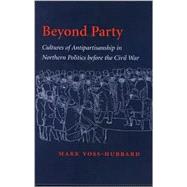Beyond Party : Cultures of Antipartisanship in Northern Politics Before the Civil War
, by Voss-Hubbard, Mark- ISBN: 9780801869402 | 0801869404
- Cover: Hardcover
- Copyright: 9/9/2002
Captivating disgruntled voters, third parties have often complicated the American political scene. In the years before the Civil War, third-party politics took the form of the Know Nothings, who mistrusted established parties and gave voice to anti-government sentiment. Originating about 1850 as a nativist fraternal order, the Know Nothing movement soon spread throughout the industrial North. In Beyond Party, Mark Voss-Hubbard draws on local sources in three different states where the movement was especially strong to uncover its social roots and establish its relationship to actual public policy issues. Focusing on the 1852 ten hour movement in Essex County, Massachusetts, the pro-temperance and anti-Catholic agitation in and around Dauphin County, Pennsylvania, and the movement to restrict immigrants' voting rights and overthrow "corrupt parties and politicians" in New London County, Connecticut, he shows that these places shared many of the social problems that occurred throughout the North--the consolidation of capitalist agriculture and industry, the arrival of Irish and German Catholic immigrants, and the changing fortunes of many established political leaders. Voss-Hubbard applies the insights of social history and social movement theory to politics in arguing that we need to understand Know Nothing rhetoric and activism as part of a wider tradition of American suspicion of "politics as usual"--even though, of course, this antipartyism served agendas that included those of self-interested figures seeking to accumulate power.






